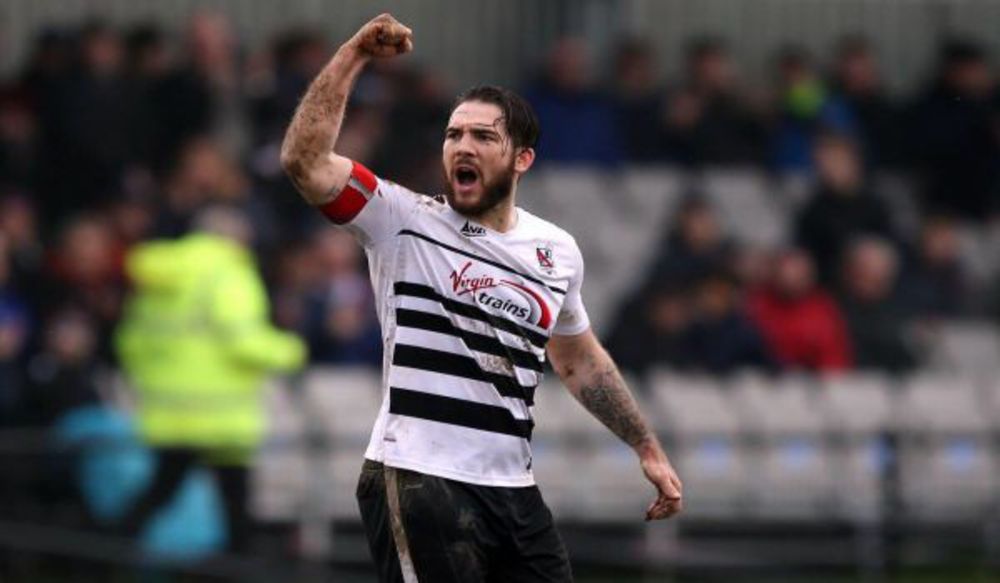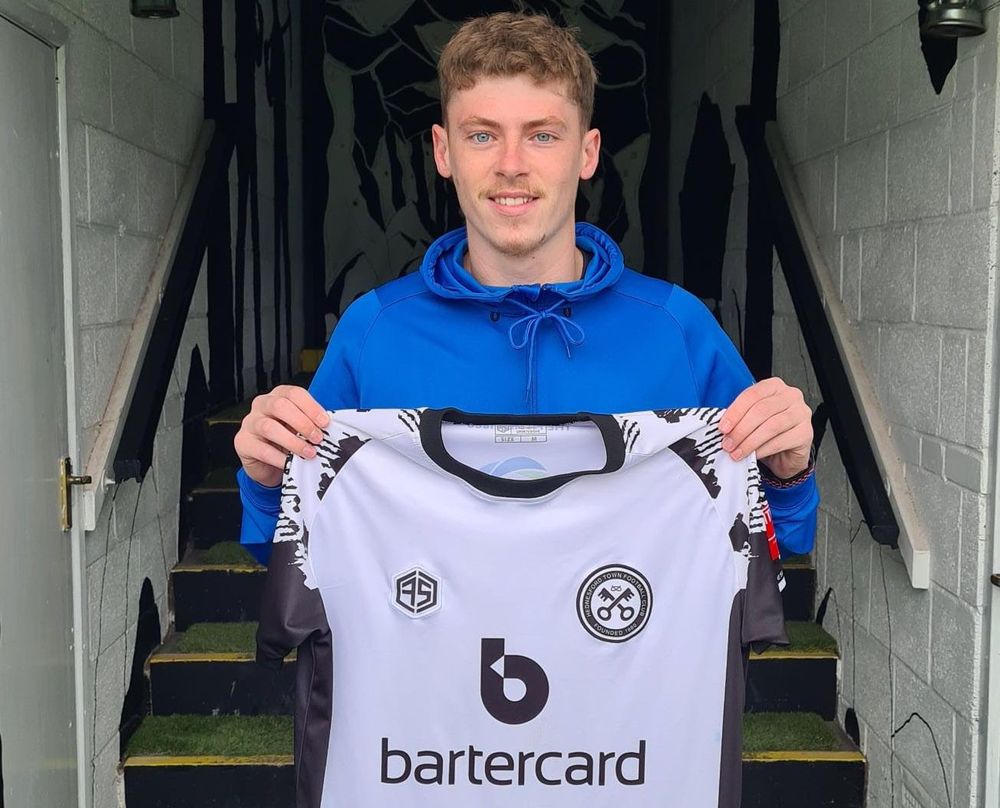[ad_1]
Date: Sat 10 Sep 2022
By Steve Whitney
Continuing the occasional series on players who have represented the current clubs in the Southern Football League.
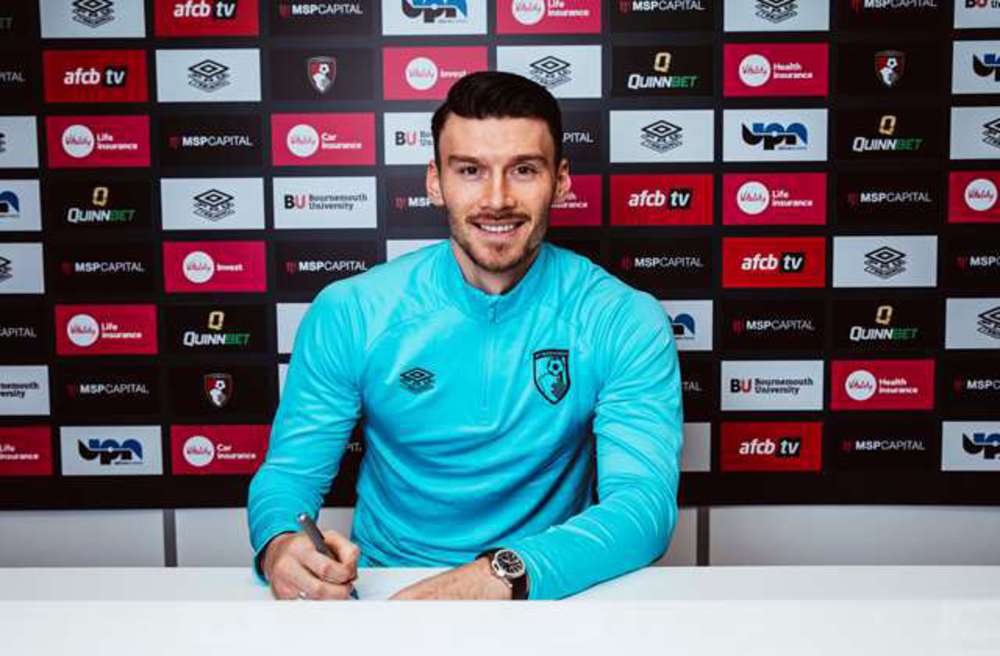
Kieffer Moore
Undoubtedly one of the best-known former Truro players of more recent times is striker Kieffer Moore.
Born in Torquay, Moore started his career with his home-town club as a youngster and then with Paignton Saints in the South Devon League Division Two for whom he scored 47 goals in 43 matches across two seasons before signing for then-Conference South side Truro in the summer of 2012.
He went on to score 13 goals in 22 games for the White Tigers before moving to Dorchester Town in February 2013, finishing the Conference South season with 20 goals to his name.
Having caught the eye of Yeovil Town, the striker put pen-to-paper that summer and went on to make over 50 appearances for the Glovers.
He then had a brief spell with Norwegian club Viking, before returning to English football with Forest Green Rovers.
A loan stint with home-town club Torquay United saw Moore net 5 goals in 4 games, grabbing the attention of Championship outfit, Ipswich Town.
After another loan to Rotherham United, where he scored a total of 13 goals in 20 matches, and permanent spells with Barnsley and Wigan Athletic, the forward signed for Cardiff City in August 2020.
A successful campaign in south Wales saw him be named as the PFA player of the month in February after scoring 5 goals in 7 matches. He subsequently picked up the club’s player of the year award three months later.
Moore transferred to AFC Bournemouth on transfer deadline day in January 2022, signing a three-and-a-half-year deal at Vitality Stadium in a deal reckoned to be worth around £5m.
After helping the Cherries to win promotion back to the Premier League, he made his debut in the top-flight last month against Aston Villa, scoring his first Premier League goal in the 80th minute.
Internationally, Moore received his first call-up to the Welsh national team in May 2019, scoring his first goal for his country in the Euro 2020 qualifier against Slovakia.
He went on to represent Rob Page’s side at the Euro Finals, scoring the equaliser in a crucial 1-1 draw with Switzerland in the group stage.
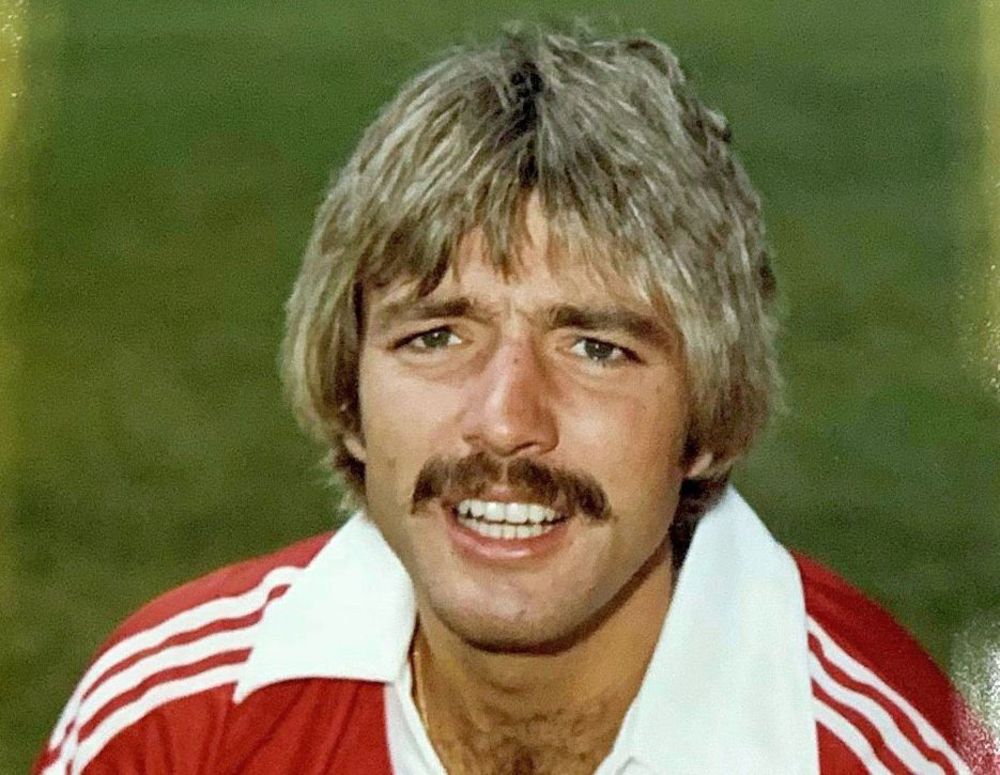
Steve Massey
A familiar name and face in West Country football is Steve Massey.
However, he was born in Denton in Greater Manchester, and started his career as an apprentice at Stockport County and made a goalscoring debut in February 1975 against Darlington, two months before his 17th birthday.
He had three full seasons at Stockport and was a first-team regular throughout his teens, scoring 24 times in 114 appearances, three of which were alongside short-term signing George Best!
In July 1978 he headed to the South Coast and was transferred to Bournemouth.
Three seasons at Dean Court yielded 22 goals in 106 appearances, despite two lengthy injury lay-offs in 1979/80 and then 1980/81 seasons.
A transfer to Peterborough United in the 1981 close season was short-lived and in February 1982 he again moved to Northampton Town.
After 5 goals in 18 starts at the end of the 1982/83 season, Massey was a fulcrum of the Cobblers’ first team in 1982/83, starting 54 games and scoring 26 goals, including a hat-trick against Swindon Town in May 1983.
Massey joined Cambridge United in August 1985 and spent one season at the Abbey Stadium, scoring 11 goals.
He moved to Wrexham in the 1986 close season and scored 17 goals in 46 appearances, including 4 goals in the European Cup Winners Cup against Maltese side Zurrieq and the Spaniards of Real Zaragoza.
He missed the majority of the 1987/88 season, making 10 appearances late in the season, and retired from professional football that summer, having scored 120 goals in 357 senior appearances.
Massey joined then-South Western League side Truro in 1988 and spent a further three years in non-league football with the White Tigers, totalling 28 goals.
He remained in Cornwall and Devon once he stopped playing and was appointed Truro’s manager in 1992, the first of three spells in charge of the club.
He left Truro in 1994 to focus on his holiday park business, returning for the 2005/06 season after a spell in charge at Falmouth Town.
In 2010 he again returned to football, managing Buckland Athletic and Bovey Tracey before a third spell at Truro that began in 2012 when appointed director of football and continued as a manager in 2013/14 season after the club went into administration and were relegated from the Conference South.
In 2017 he was appointed football consultant, then director of football and manager at South West Peninsula League side Helston Athletic.
Millbrook-born Reg Jenkins did not play youth football after a prolific record at primary school, but at 16 he was asked at short notice to fill a gap in his local side.
From there he went to Truro and alerted scouts with his goalscoring form before joining Plymouth Argyle, initially as a semi-professional, in 1957.
He made his debut in 1958 and his first League goal was in a home fixture against Chesterfield, whose goalkeeper that day was none other than Gordon Banks who went on to be England’s custodian, including the World Cup Final win in 1966.
Jenkins was released by Argyle in December 1960 and joined Exeter City for the remainder of the season.
He then moved to Torquay United, making 88 League appearances in three years, but he really made his name in eight seasons at Rochdale, where he scored 119 goals in 305 League appearances, and was a member of their first-ever promotion side.
He remains Dale’s record goalscorer and in 2005 was voted the club’s best-ever player by its fans.
He came back to Cornwall with Millbrook and then had a short spell at Falmouth Town in 1974.
He returned to the game as manager of Bodmin Town in the early 1980s and even made several appearances as a player for the club at the age of 42!
Freddie Fox played once in goal for England in May 1925 in a 3-2 win in Paris against France in an end-of-season friendly.
He played junior football in Swindon before joining Swindon Town during the First World War.
After the war, he was playing with Welsh side Abertillery during 1920/21, before signing with Preston North End in August 1921.
He made just 3 League appearances before being transferred to Gillingham in July 1922.
After 106 appearances, he was placed on the transfer list in March 1925 and joined Millwall Athletic in April 1925.
After just 28 outings, Halifax Town signed Fox in June 1927, where he made another 13 League appearances.
He moved to Brentford on transfer deadline day, March 1928, going on to make 74 appearances.
In September 1931, Fox obtained the license of The Hope Inn in Truro and he signed for then Cornish League side Truro in October 1931.
He also played cricket for Truro CC and represented Cornwall.
Although the Second World War was at an end, the Football League divided its competition into regional sections for the 1945/46 season because of the exceptional conditions at that time, with so many players still serving in the Armed Forces or employed on essential war work.
Plymouth Argyle played in the Football League South that season, against first-class opposition such as Arsenal, Chelsea, Spurs, Aston Villa and Wolves.
It proved impossible for the Pilgrims to field a regular side – 72 players made an appearance and performances inevitably suffered.
From week to week the club called on Armed Services players, guest footballers from other League clubs and local amateurs to supplement its registered playing staff.
Jack Hodge was one of 21 players whose only first team games for Argyle were in the Football League South season and who usually played in local football or for the Armed Forces.
Born in Plymouth, he began his football as an outside-right with Truro and then Greenwaves, Halls Engineers and Pearn Bros in the Plymouth & District League, prior to signing for Argyle from St Austell in 1933.
Without breaking into the Home Park first team, he moved on to Bristol City in 1934, scoring 8 times in 62 appearances before joining Luton Town, where he chalked up another 20 appearances.
From 1937 he spent two seasons with then-Southern League Colchester United, becoming the first to make 100 starts for the club and scoring an impressive 42 goals in his total of 111 games.
In the summer of 1939, he headed for Hereford United, but when war was declared that September, he returned home to work in Devonport Dockyard.
He played for a variety of local sides whilst serving in the dockyard, including the Devonport Dockyard team, the Royal Naval Torpedo Depot (with whom he broke a leg), Plymouth City and Plymouth United.
There is also a suggestion that he played for Chelmsford City for a spell in 1941; perhaps he was seconded to the extensive light-engineering facilities there.
Hodge finally got a second chance at Home Park over a decade after his first when he signed from Plymouth United, registering with the Football League in November 1945.
He played three times but never on a winning side, in what was a wretched season for the club.
He also appeared once as a wartime guest for Torquay United that season.
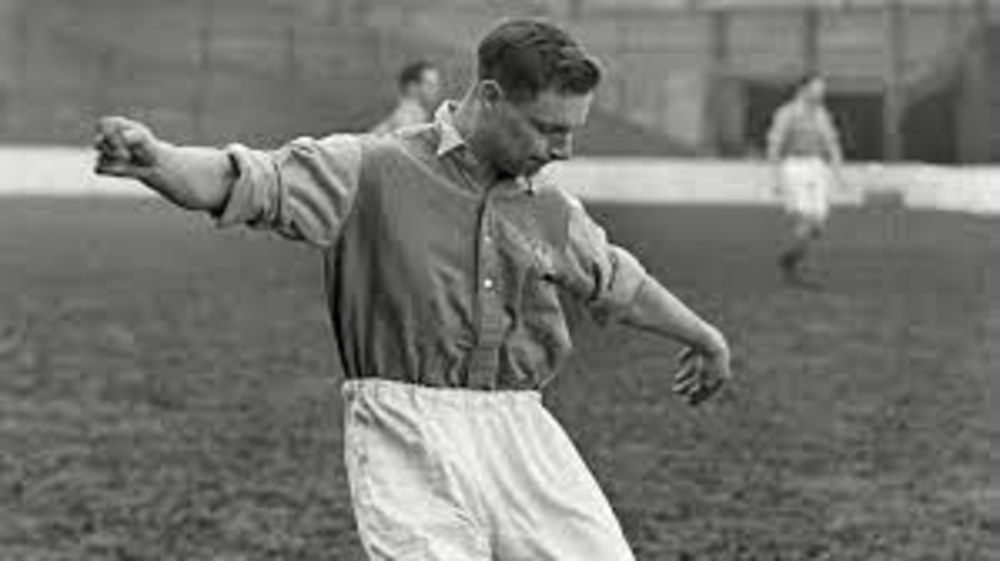
Gerry Gazzard
Gerry Gazzard was nicknamed the `Pirate of Penzance by West Ham United fans.
The likeable West-countryman was discovered playing as an inside-forward for Penzance and with Truro but had turned out 20 times as an orthodox winger for the county of Cornwall.
Signing professional for West Ham in May 1949, he made his first team bow against Luton Town on the opening day of the following season.
He made 37 appearances in 1949/50 and was one game short of being an ever-present the next campaign.
Troubled by cartilage injury, he transferred to Brentford after losing his place to Johnny Dick, and finally saw out the remainder of his playing days back at Penzance as a re-instated amateur with the Pirates.
Isaac Vassell grew up in Newquay, Cornwall, and began his career with Plymouth Argyle.
Following a variety of loan spells, the forward joined Truro in 2014, scoring 22 goals.
His 13 strikes in 2014/15 helped the White Tigers to promotion to the National League South.
Cousin of former Aston Villa and Manchester City striker Darius Vassell, Isaac’s scoring record earned him a move to the Football League in 2016, signing for Luton Town.
He continued his impressive form into the 2016/17 season, netting 14 goals in all competitions and his goals helped the Hatters to the League Two play-off semi-finals and he scored in the first leg against Blackpool.

Isaac Vassell
A gifted all-round track and field athlete in his youth, he joined Birmingham City in 2017.
A powerful and pacey forward, Vassell signed a three-year deal at Cardiff City until the summer of 2022, scoring the winning goal on his home debut against his former club, Luton.
But his time at the Cardiff City Stadium was blighted by injury and he was released at the end of last season.
Born in Kilsyth, left half Alex Hardie played for Third Lanark in his native Scotland before moving to Charlton Athletic for 28 games in 1925.
Moving to Plymouth Argyle from The Valley the following year, he spent eight seasons at Home Park, with a reputation as a consistent performer, a crisp tackler and a smooth passer of the ball.
He left Argyle for Exeter City in 1933, where he finished his Football League career after 18 games and went on to play for Truro.
Liverpool-born Barry Pierce was originally on the books as amateur with Everton and Stockport County without making the breakthrough.
It was whilst on National Service that the inside forward began playing for Truro in the South Western League in 1954.
He was spotted playing for the White Tigers by Crystal Palace manager Cyril Spiers, who gave him his chance in August 1955.
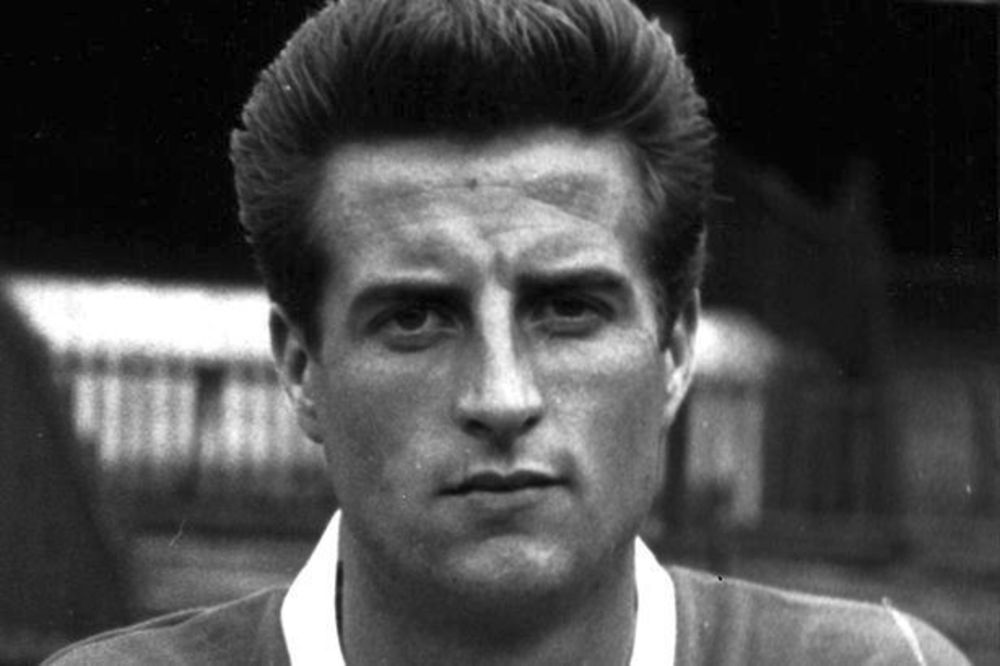
Barry Pierce
It was to be a good signing for Palace as he netted 23 goals in 85 appearances.
He then moved to Millwall in May 1959, where he added a further 17 goals in in 46 starts.
After two seasons at The Den, Pierce moved north to link up with York City in July 1961, and again his return of goals, 5 in just 12 league appearances was good.
However, he was released on a free transfer and took the chance to join his former manager Spiers, by then boss at Exeter City, in July 1962.
He went straight into the team and made his debut on the opening day of the season against Torquay United.
It proved to be a disappointing season for the Grecians though as they finished in 17th place in Division Four, and with Spiers having been replaced as manager, Pierce moved on as well to sign for Southern League side Salisbury City in the summer of 1963.
He remained in the south-west to assist at a number of non-League outfits before dementia sadly took his life a few days before his 86th birthday in August 2020.
Defender or midfielder Leigh Cooper joined Plymouth Argyle as a schoolboy and progressed through the youth system before being give his first team debut by manager Bobby Saxton in November 1979 at Colchester United in the FA Cup
In his first season, he made 16 League and cup appearances.
1980/81 saw Cooper score his first goal for the club in a 2-0 home win over Millwall and the following season saw him miss only 3 games with his goal tally rising as well even though he didn’t score a goal until January 2nd, he got two at home to Bristol Rovers.
Season 1982/83 saw Cooper be almost ever-present in the team, missing only one game and adding another 4 goals to his total.
And the following campaign was a memorable one for Cooper as he was appointed as captain at the age of only 22 – one of the youngest players to captain a League side.
He made 43 League and an amazing 16 cup appearances over the season and the highlight of his season must have been leading his team out in the FA Cup semi-final against Watford at Villa Park in front of 43,858.
Unfortunately, it was Watford’s George Reilly who scored the only goal of the game, but it was still a superb achievement for Argyle of Division Three to have got so far.
Cooper spent two successful seasons in Division Two before being awarded a testimonial and in August 1988 against Coventry City, 5,027 turned up to see Argyle beaten 2-1.
Unfortunately, disaster struck later in the season in a game at Fratton Park Portsmouth when Cooper broke his leg.
After spending the rest of the season and most of the next recuperating he only played another two games for the club – his final game coming on 17th March 1990 in a 0-0 draw at Stoke City – and after playing 387 games and scoring 18 goals he left Plymouth to join Aldershot.
Unfortunately, Aldershot were in serious financial difficulties and after 18 months when he made 33 appearances and scored 2 goals, the club were wound up in the High Court and forced to resign their membership of the Football League, leaving Cooper and the rest of the team out of work.
He returned to the West Country to continue his playing career with Truro in the South Western League but his playing career was finally brought to an end by a second broken leg.
After hanging up his boots, he managed Truro from 1994 until 1998, leading them to two league titles, and then Holsworthy, Saltash United and Liskeard Athletic, combining these with running a training and development company in Plymouth.
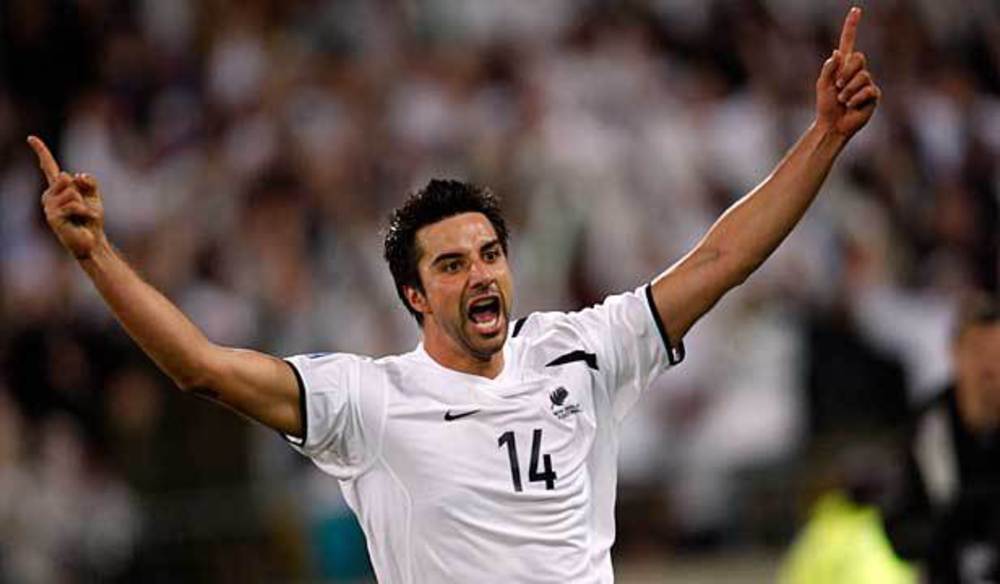
Rory Fallon
A former international footballer to wear Truro colours was Rory Fallon.
Born in Gisborne, New Zealand, he started his career in south Yorkshire with Barnsley in 1999.
He went on to make over 50 first-team appearances and also spent time on loan with Shrewsbury Town whilst with the Tykes.
Moves to Swindon Town and Swansea City followed before he left the Vetch Field to join Plymouth Argyle for £300,000 in January 2007.
In total, Fallon played 149 games, scoring 22 goals for Argyle, before he left Home Park for a return to Yeovil Town, where he had been on loan in 2005, in August 2011.
But Fallon left Huish Park after a month and went on to play for Aberdeen, St Johnstone, Crawley Town, Scunthorpe and Bristol Rovers before finishing his career in non-League football, joining Truro in 2016.
He left the White Tigers for brief spells with Torquay United and Dorchester Town before hanging up his boots in 2017.
After retiring, Fallon worked with Plymouth Argyle’s under-14 players and in October 2019, was appointed assistant manager for the New Zealand national team.
Born in Walsall, Norman Ashe came to the attention of Football League scouts whilst representing Brierley Hil, Sedgley and Tipton Schoolboys.
He went on to represent Staffordshire, Birmingham County and England Schoolboys.
On leaving school, Ashe chose to join Aston Villa, rejecting the approaches of several other First Division clubs.
He made steady progress at Villa Park and broke into a first team that went on to be known as Joe Mercer’s `Mini-Minors`.
Despite his undoubted potential, Ashe was only selected for 5 Villa senior games and in 1962, left to join Rotherham United.
But he made just 6 appearances for the Millermen, scoring his only League goal, and by 1964, his full-time career was over at the age of just 20.
He signed for Southern League club Nuneaton Borough and enjoyed a five-year spell at the Manor Ground, making 161 appearances and scoring 42 goals.
In 1969, he moved to the West Country and joined Falmouth Town which became something of a `spiritual` home for him.
In three separate spells covering 10 years, he played over 200 times for the Fishermen.
In between spells with Falmouth, Porthleven and Illogen RBL, he joined Truro in 1978 and spent four years with the White Tigers in the South Western League.
He returned to Falmouth before hanging up his boots in 1985, having played until the age of 40.
[ad_2]



